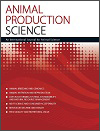Animal Production Science
Volume 64
Number 9 2024
Selection for growth rate is a powerful tool to alter beef cattle performance but the evidence for an improvement in feed efficiency is equivocal. This experiment found that selection for faster growth in Angus cattle resulted in heavier cattle that ate more in the feedlot, with no evidence of improvement in feed efficiency. Breeding programs that place emphasis on growth rate need to be cognisant of the proportional increase in feed requirement by bigger animals.
The ensiling process presents losses that are associated with the fermentative profile, resulting in lower nutritional value and lower aerobic stability of silages. The study evaluated the effects of adding chitosan and microbial inoculants to Mombasa grass (Megathyrsus maximus) silage. Chitosan altered some variables of the fermentation profile, but the treatments did not show a relevant effect on fermentation losses, chemical composition, and aerobic stability.
Tannins are secondary compounds that act to protect proteins from microbial degradation. Affinity between tannins and proteins is due to the presence of multiple phenolic hydroxyl groups in tannins, which promotes an easier connection with proteins. Tannins can decrease proteolysis in silage, inhibiting microbial action, through the protein-bound linkage in the ensiled mass. Thus, it is recommended to include of tannin as an additive in sorghum silage to improve fermentation patterns, diminish aerobic deterioration, as well as improve digestibility.
This study explores the impact of zinc supplementation to improve the quality of cooled equine semen, addressing a crucial aspect of genetic preservation in horses. The findings showed that adding various concentrations of zinc to the sperm does not significantly enhance sperm quality during cold storage and concentrations exceeding 3 mM had detrimental effects. These findings challenge the common belief of the protective role of zinc in sperm preservation, contributing valuable insights for the equine breeding industry.
This article belongs to the Collection Equine Science Part II.
The dairy industry’s recent growth in Ireland has resulted in a high demand for additional workers, increasing the requirement for farmers to be skilled in Human Resource Management (HRM). This study identified that the adoption of HRM practices is influenced by farm characteristics, in particular herd size, the number of employees on the farm. This study has contributed insights into the prevalence of specific HRM practices on Irish dairy farms, and indicated that there is a significant scope for improvement. A novel aspect of this study was the focus on the potential factors that influence the adoption of HRM practices on Irish dairy farms. The findings of this study could be used by agricultural advisors and those working in HRM to provide tailored advice to support dairy farmers and other small business owners in managing their employees.





